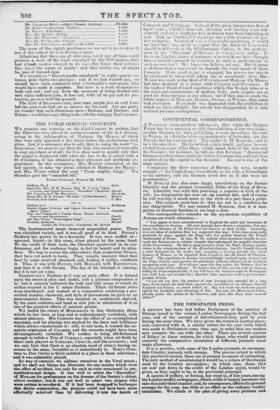THE PHILHARMONIC CONCERTS.
WE premise our remarks on the third Concert by stating, that the Directors were placed in embarrassment at the last minute, owing to the indisposition of Madame DE MERIC, of which they were only apprized a few hours before the performance took place. And it is necessary also to add, that, in using the word " in- disposition," we mean to say that the lady was too unwell to be able to sing anywhere or at all; for it is often used to signify only that the singer is displeased with what she has to do, is seized with a fit of laziness, or has obtained a more pleasant and profitable en- gagement. In this emergency, Mrs. Brsiree consented, at the last minute, to take the pieces allotted to Madame DE MERIC ; and Mrs. WOOD added the song " From mighty kings." We therefore give the "amended bill."
THIRD CONCERT, MARCH 26, 1832. ACT I.
Sinfonia, No. 2 Spohr. Quartetto. Mrs. H. R. Bishop, Miss II. CAWSE, Signor CORIONI, and Signor G/IIBILEI, "Recordare" (Requiem) Mozart.
eheles.
MS. Concerto in C, Mr. Moscuuss itoseheles. Steno, Mrs. II. H. Brsuoe, "Mi tradl"(21Dos Giovanni).. Mozart. Overture, Don Carlos F. Ries.
ACT II.
Sinfonia iu C Beethoven. Duetto, Signor CURIONI and Signor GILIBILEI. "Son i0 dssto" ( Foetidly. Arbta) et Trio, two Violoncelli e Contra Basso, Messrs. LINDLEY, CROCCIT, and DRAGONETTI Corelli. Air, Mrs. Moon. " From mighty kings" Handel. Overture, Idomeneo Mozart. Leader, Mr. WatensEL—Conductor, Mr. BISHOP.
The Instrumental music deserved unqualified praise. There was abundant variety, and it was all good of its kind. SPOHR'S Sinfonia has grown to be a favourite. It was once scoffed at— spurned, hissed—in this room, when played by the same band: To the credit of their taste, the Directors persevered in its per- formance, and the audience begin to feel its beauty and its gran- deur. We beg to assure the subscribers, that, respecting SPOHR, they have yet much to learn. They usually measure what they hear by some received standard, and, finding it unlike, condemn it. Thus it was with HAYDN, with MOZART, with BEETHOVEN, and thus it is with SPOHR. The day of his triumph is coming, but it is not yet come.
BEETHOVEN'S Sinfonia in C was an early effort. It is formed upon the received plan and model, and a glorious composition it is; but it scarcely indicated the bold and lofty range to which its author aspired in the C minor Sinfonia. There all former rules were abandoned; and instead of a composition containing a pre- scribed number, character, and style of movements, he gave us an instrumental drama. This was laughed at, condemned, shelved, by the same audience and band as now join in admiration of it as one of the greatest efforts of musical genius.
We hailed the return of MOSCHELES to this Orchestra (from -which he has been so long and so unhandsomely excluded), with sincere pleasure. His Concerto was the effort of an accomplished musician, and his playing was marked by the force and brilliancy which always characterize it : still, to our taste, it wanted the ex- quisite expression of CRAMER, and the concerto might have been advantageously curtailed. We confess to being old-fashioned enough to relish a Trio of CORELLI, especially when set forth by three such players as LINDLEY, CROUCH, and DRAGONETTI ; and we only hint that there is no absolute need of always having re- course to the same, beautiful as it undoubtedly is. RIES'S Over- ture to Don Carlos is fairly entitled to a place in these selections ; and it was admirably played. By way.ofcautrast, we address ourselves to the Vocal music ; and we shall not blame the Directors for any results which were the effect afaccident, but only for such as were occasioned by pre- meditationand design. It was well to select the "Recordare" of MOZART for perfonnaance on the decease of the Society's oldest, ablest member; 'but& was not well to select two singers who were certain teanurderat. If it had been designate burlesque this divine composition, .the purpose could not have been more effectually ar.hipved than by delivering it:into the hands of C URI 0 N I and GI URI 'LEI. Instead .of the pure, harmonious flow of equal voice:a which it demands, shouting and bawling were sub- stituted, and not a single bar was in .decent tune from beginning to end. And the Duetto of PaEsIELio was a like snecimen of per- fect vulgarity.. Instead of sacla a disg:aceful exhibition, it would not have been too much to expect that the death of CLEIIENTI should be fbllewed, in the Philharmonic Society, by the perform- ance of the " Reciniem" of Mozarer or CHERUBI NI entire.' Is there an English singer ger of eminence who would not have thought- him or herself honoured by assisting in such a performance on such an occasion ? We hope—we believe, not one. But it seems: as if there were a conspiracy to degrade the vocal music of these. Concerts. If one good singer is engaged, her powers are sure to: be paralyzed by those with whom she is associated: thus Mrs.. WOOD was sunk to the level of WINTER, and Miulame DE MERIC had been destined to a union with CURIONI and GILIBILEI. If the highest flight of vocal excellence which this Society aims at is the worn-out compositions of modern Italy, such singers are as good for their purpose as any others : but if they aim to reach the loftier regions of MOZART, HAYDN, SPOHR, or WEBER, they must look elsewhere. EN embody was disgusted with the exhibition to which we have alluded; but nobody was disappointed, for it only realized previous anticipations.



























 Previous page
Previous page